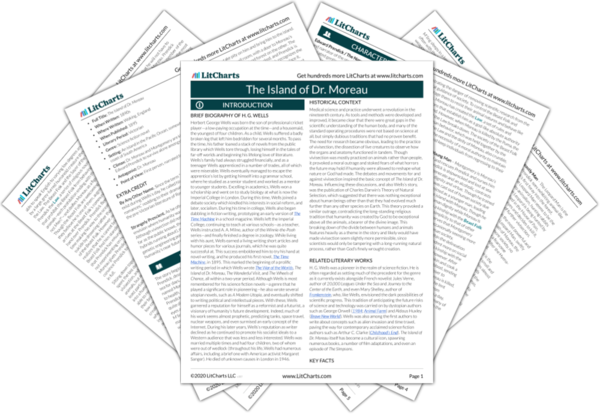Welcome to the LitCharts study guide on H. G. Wells's The Island of Dr. Moreau. Created by the original team behind SparkNotes, LitCharts are the world's best literature guides.
The Island of Dr. Moreau: Introduction
The Island of Dr. Moreau: Plot Summary
The Island of Dr. Moreau: Detailed Summary & Analysis
The Island of Dr. Moreau: Themes
The Island of Dr. Moreau: Quotes
The Island of Dr. Moreau: Characters
The Island of Dr. Moreau: Symbols
The Island of Dr. Moreau: Literary Devices
The Island of Dr. Moreau: Theme Wheel
Brief Biography of H. G. Wells

Historical Context of The Island of Dr. Moreau
Other Books Related to The Island of Dr. Moreau
- Full Title: The Island of Dr. Moreau
- When Written: 1890s
- Where Written: Woking, England
- When Published: 1895
- Literary Period: Victorian
- Genre: Science fiction novel
- Setting: An island in the Pacific Ocean, somewhere off the coast of South America
- Climax: Dr. Moreau and Montgomery are killed, leaving Edward Prendick to survive alone amongst the Beast Folk.
- Antagonist: Dr. Moreau
- Point of View: First person, narrated by Edward Prendick
Extra Credit for The Island of Dr. Moreau
By Any Other Name. Since the term “science fiction” did not exist during Wells’s day, he called his stories “scientific romances,” nodding to their dramatic arcs and influence from the pre-Victorian literature of Romanticism.
Strangely Prescient. As he often did, Wells seemed able to envision where humanity was headed in the writing of his story. Although vivisection did not turn out exactly as he thought (as far as the public knows, there are no half-human, half-animal hybrids running about), modern advances in biological and genetic engineering pose similar ethical dilemmas for humanity’s near future.












